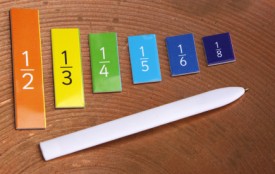
Educators and psychologists like to talk about predictors--we like to know what about today can tell us about how students will achieve tomorrow. While such knowledge is academically interesting, its true value only lies in the action it inspires.
For example, a recent study published in Psychological Scienceoutlines the early predictors of mathematics achievement (Siegler, 2012). Based on various theories of how humans naturally develop numerical concepts, the research team hypothesized that an early understanding of fractions could predict how well a student would perform in algebra and general mathematics later on. Siegler’s earlier research had revealed that a student’s understanding of the number line was critical to future mathematical success; this recent publication is an extension of those original findings.
In the 2012 study, the team did a retrospective study of data from two populations of students – one in the United States and one in England. The data indicated that their hypothesis was true: fractions knowledge indeed predicted later success. After controlling for intellectual ability, family background and existing mathematical abilities, the students who had a greater understanding of fractions early on ended up doing better in algebra and math in high school, 5 or 6 years later.
The paper’s authors say it well: “If researchers can identify specific areas of mathematics that consistently predict later mathematics proficiency…society can increase efforts to improve instruction and learning in those areas.” (2012)
So, we have a solid hypothesis, and the data support it. With the scientific method as their toolset, the research team provided us with a bit of useful, straightforward information. The real question becomes: what do we do with this knowledge?
Let’s bring this down to the level of practice: what are some simple things parents and teachers can do to help young learners develop a better understanding of fractions?
- Make it visual.Use lots of visuals and manipulatives – paper cutouts, blocks, Legos®, pies – anything to help students visualize fractions.
- Make it reflective. When you tell a learner, “You’ve got three quarters of an hour to do this task,” push their understanding of the idea. In passing, ask them how many minutes that is in comparison to how many minutes there are in a whole hour. Little mental puzzles not only make for fun interactions, but challenge and extend understanding.
- Make it practical.Instead of using a pie chart, how about baking an actual pie? Working with recipes is a fun, hands-on way to teach and learn fractions. (And when it comes to motivating learners, don’t underestimate the value of a pizza; it makes fractions not only come alive, it makes them smell and taste delicious.)
- Make it ubiquitous.Fractions are truly everywhere: in the car, at the supermarket, at the hardware store. I challenge you to find a place where we go in daily life that fractions are NOT part of the environment. Look for fractions when you’re with young learners and call them out: “Hey, those sodas come in 12-packs. We only need half. How many is that?” The more they are exposed to them, the greater opportunity learners will have to absorb the concepts.
One crucial reinforcement to the above strategies comes from Siegler’s findings about the importance of the number line. It is helpful to use the strategies above, but the student must ultimately understand how that fraction is represented in relation to other numbers (e.g., knowing that 2/4 and 1/2 are the same point between 0 and 1). Use the strategies above to engage learners, but always remember to reinforce the concepts by taking the activity back to the number line.
Studies like the ones I’ve discussed can be great, enlightening tools. They show us a relatively straight road to get from here to there and a clear relationship of cause to effect. If we can help students understand fractions early, given the regular patterns of development and learning, those students will have advantages when it comes to developing deeper math skills later on.
The simple problem is that acting on this knowledge takes change. Do we have the will to take on those changes?
Resources:
Seigler, R.S., Duncan, G.J., Davis-Kean, P.E., Duckworth, K., Claessens, A., Engel, M., Susperreguy, M.I., Chen, M. Early Predictors of High School Mathematics Achievement. Psychological Science. 14 June 2012.
Related Reading:

